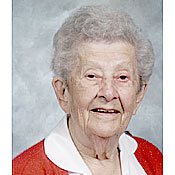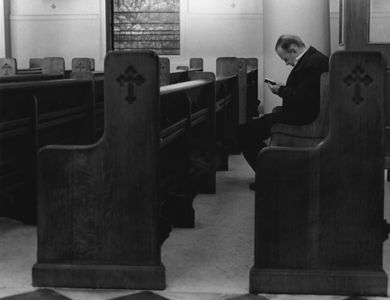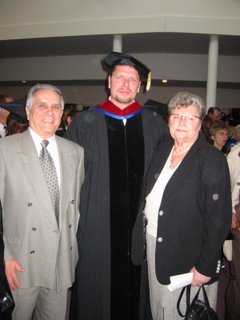
Working parents spend too little time with their children!?
This was an article I have kept for quite a while, and I think it is time that I bring it out to share again. Read it and share your thoughts. It is a little dated, but that is OK!
by Laura Shapiro Newsweek May 12 1997, v129, n19, p62(7) COPYRIGHT 1997 Newsweek Inc.
Kids don't do meetings. You can't raise them in short, scheduled bursts. They need lots of attention, and experts warn that working Parents may be shortchanging them
FOR THE NEW YORK LAWYER, IT ALL HIT HOME in the grocery store. She had stopped in with her 6-year-old to pick up a few things, but since the babysitter normally did the shopping, she was unprepared for what was about to happen. Suddenly there was her son, whooping and tearing around the store, skidding the length of the aisles on his knees. "This can't be my child," she thought in horror. Then the cashier gave a final twist to the knife. "Oh," she remarked. "So you're the mother." That was the moment when the lawyer was forced to admit that spending "quality time" with the kids didn't seem to be working. She and her husband, a journalist, had subscribed in good faith to the careerists' most treasured nile of parenting: it isn't how much time you spend with your kids, it's how you spend the time. But despite those carefully scheduled hours of parental attention between dinner and bed, their two kids were in danger of turning into little brats. "I don't want to come home and find my kids watching cartoons and demanding every new product Disney put out this week," she says. "It's not that sitters do a bad job, but sitters don't raise kids. Parents do." Next month the family is moving to a suburb, and she'll go to work part-time.
Not every family can, or wants to, make a life change on that scale. But many are starting to question whether time devoted to theft children really can be efficiently penciled into the day's calendar, like a business appointment with a couple of short, excitable clients. No wonder a growing number of psychologists and educators who work with children would like to get rid of the whole idea of quality time. "I think quality time is just a way of deluding ourselves into shortchanging our children," says Ronald Levant, a psychologist at Harvard Medical School. "Children need vast amounts of parental time and attention. It's an illusion to think they're going to be on your timetable, and that you can say 'OK, we've got a half hour, let's get on with it'." For parents who love their kids and also love their work, there's no more insistent wake-up eau than Arlie Hochschild's new book, "The Time Bind," just published and already hovering in the nightmares of anyone who has ever sung a lullaby over the phone. Hochschild's most chilling insight is our complicity in depriving our children. "Many working families," she writes, "are both prisoners and architects of the time bind in which they find themselves."
Quality time arrived on the scene in the early'70s, featured in a wave of research including a now famous study by Alison Clarke-Stewart of the University of California, Irvine. She found (and recent brain research backs her up) that the more actively mothers were involved with their babies, talking and cooing and so forth, the better it was for the babies' cognitive and social development. Babies who spent time with their mothers but didn't get as much of the goo-gooing and eye contact did less well. "But to be able to have that high-quality time, you have to invest a certain amount of pure time," says ClarkeStewart. "It's not just 10 minutes a week." Such nuances quickly dropped away as baby-boomer couples found quality time an immense help in juggling two careers and a potty chair. Today it's not even clear what most people mean when they use the term--is playing patty-cake supposed to be a higher-quality activity than driving to ballet lessons? Does family dinner count if the TV is on? Very softly? All we reliably know is that whenever time with kids is in short supply, calling it "quality time" makes parents feelbetter.
Experts say that many of the most important elements in children's lives--regular routines and domestic rituals, consistency, the sense that their parents know and care about them--are exactly what's jettisoned when quality time substitutes for quantity time. "Mom is working until 4:80 and has to get the groceries and do the laundry and the chores and pick somebody up from soccer and drop somebody off at ice skating," says Chicago psychologist Vicki Curran. "The structure of the day disappears. But the structure, and the availability to one another, provide the safe arena we know as home." Nor do kids shed their need for parental time when they get to be teenagers. "One of the functions of parents is monitoring--you monitor their homework, their friends, what they're really doing in their spare time," says Jeanne Brooks-Gunn, a developmental psychologist at Columbia University. "I don't think we've said enough to parents about how the demands on them change when early adolescence hits, and kids may start to engage in drugs or sex. Monitoring is critical."
Parents who race in the door at 7:80 p.m. and head straight for the fax machine are making it perfectly clear where their loyalties lie, and the kids are showing the scars. "I see apathy, depression--alack of the spunkiness I associate with being a kid," says Levant. "These kids don't have the self-esteem that comes from knowing your parents are really interested in you, really behind you." Kevin Dwyer, assistant executive director of the National Association of School Psychologists, says teachers are reporting increases in discipline problems and classroom disruptions. "One of our concerns is that parents are not spending enough time with their kids," he says. "Most of the parents we see are really drained at the end of the day." The result is inconsistent discipline and all the problems it spawns. "There's a tremendous amount of research showing that inconsistency leads to kids' being more aggressive, more deviant and more oppositional," says Dwyer.
In "The Time Bind," Hochschild analyzes in depth a large corporation she calls "Amerco." She spent months interviewing employees, from the CEO to the factory shift workers, and found many who complained about long workdays and hectic home lives. But few of the employees were taking any steps to carve out more time with their families-they weren't taking unpaid family leave even if they could afford it, and they weren't applying for flextime or job sharing. Hochschild's startling conclusion was that for many workers, home and office have changed places. Home is a frantic exercise in beat-the-clock, while work, by comparison, seems: a haven of grown-up sociability, competence and relative freedom. Quality time has been a crucial component of this transformation. "Instead of nine hours a day with a child, we declare ourselves capable of getting the 'same result' with one, more intensely focused, total quality hour," she writes. Hochschild describes some of the Amerco kids as essentially on strike against their assembly-line lives. "They sulk. They ask for gifts. They tell their parents by action or word, 'I don't like this'."
Not all researchers agree with Hochschild's analysis or her view of its consequences for kids. "What she's describing is a class phenomenon," says Rosalind Barnett, a psychologist and senior scholar at Radcliffe College. "I don't think most ordinary Joes confuse work with family. Work is work." Barnett and journalist Caryl Rivers are the authors of "She Works/He Works," which describes the results of a four-year, $1 million study of 300 two-earner couples in the Boston area. The authors and their team of interviewers found that both men and women in this random sample reported high levels of satisfaction with their lives, despite the stress, and warm, close relationships with their children. "Most see their families as the center of their emotional lives," they write. Barnett says their study jibes with many others-- for instance, a 1995 survey of more than 6,000 employees at DuPont, showing that nearly half the women, and almost as many men, had traded career advancement to remain in jobs that gave them more family time. Fran Rodgers, CEO of Work/Family Directions in Boston, agrees that national surveys give results different from Hochschild's focus on one company. "What people really want is both to be good parents and good at work," she says.
Underlying at least some of the criticism of Hochschild's work is the fear that to acknowledge problems with our kids is to invite a backlash against women's working. That's mighty unlikely to change. Not only do women work for the same reason men do--they need the money--but surveys have also consistently shown that employed women are happier, healthier and feel more valued, even at home, than women who are full-time homemakers. "Even if women did go home, it wouldn't be the best solution," says Stephanie Coontz, author of "The Way We Never Were," an examination of the real, as opposed to the mythic, world of the '50s. Her new book, "The Way We Really Are," takes a similarly unblinkered look at the present. "Suppose the wife quits work for a year when the kids are little," she says. "She becomes the specialist in child nurturing, and the man never catches up. He doesn't have the initial skills, and she's got a year's head start. Research shows that men do more and better child care when their wives aren't home." Studies also clearly indicate that children whose fathers are thoroughly involved in their care do better socially and cognitively than kids whose fathers play a more marginal role. What's more, the involved fathers are happier than the marginal ones--you know, the daddies talking intently into cell phones during the entire Little League game.
In light of this data, one way to start solving the problems posed by quality time seems obvious: guys, go home. It's 5 p.m. Women may feel guiltier than men about working, women may choose to cut back their careers, but if our kids are hurting for lack of family time, it's not a women's issue, it's a family issue. And studies overwhelmingly show that men's contribution to housework and child care ranges from a third to a half of what women do (chart), though the numbers have been inching closer in recent years. Then there was the 1993 survey by the Families and Work Institute that asked dual-earner couples how they divided responsibility for child care. "We share it 50-50" was the response of 43 percent of the men--and 19 percent of the women.
James Levine, director of the Fatherhood Project at the Families and Work Institute, says change is happening slowly, but it's happening. Time with their children is increasingly important to men, he says, but some are unwilling to confront a corporate culture that values long hours and face time above all. "I find guys doing all kinds of strange things to avoid publicly acknowledging that they have parental responsibilities," says Levine. "They'll sneak out to pick up their kids at day care, or wait just a few minutes after their boss leaves to go themselves. People need to break this pattern and start taking responsibility."
Some men do break the pattern, though it's easier at the high end of the pay scale. New York attorney Franz Paasche tried hard to keep weekends with his family sacrosanct. But he found that work was lasting later and later on Fridays, and starting up earlier on Sundays. So he hanged to a new job with more flexible hours. Now, he says, he never misses walking his daughter to the school bus and buckling her seat belt; and even if he has to work at night, he has dinner with the family and reads bedtime stories first. "These days are not replaceable," he says. "My children are different every day. That maybe the myth of quality time--that time is interchangeable."
The family-friendly policies introduced by some companies with much fanfare-- job sharing, flexible hours and the like--often don't hold up in practice. "The easiest thing for the corporate world to do is fall back on family-friendly benefits," says Lotte Bailyn, a professor at MIT's Sloan School of Management. "They're wonderful, but they're underutilized. Men hardly ask for them, and if they do they're seen as wimps. If women take them, they're put on the mommy track." Bailyn heads a research team that develops new organizational structures designed to help companies become more productive while eating up less of their employees' time. "We're reversing the idea of quality time," she says. "Quality time belongs at work. Quantity time belongs with the family."
Unfortunately, there's little in the current business climate that encourages most employees to do anything about their long hours except cling desperately to their jobs as colleagues disappear around them. Now more than ever, people have powerful financial incentives to resist making more time for families. And men, who still tend to make more money than their wives--and work about eight more hours per week -- are caught in a special time bind: if they do cut back for the family's sake, the family suffers financially. But Elizabeth Perle McKenna, whose book "When Work Doesn't Work Anymore" will be published in September, says corporate downsizing might well prompt some men to look harder at theft values. "When motherhood hit the babyboomer women, we were forced to stop and really look at work for the first time, and ask "Is this worth it to me?'" she says. "I think all the downsizing in business, and its effect on men's lives, could make them do the same thing." She also believes that younger workers, men and women starting their careers now, will have a major impact on how corporations treat families. "I interviewed young women who have no intention of sacrificing their lives for their jobs," she says. "If you're company X and you're trolling for the best people, you won't be able to ignore those issues anymore."
Corporate utopia may be a long way off, but men and women can change their own lives right now. Cutting back on work hours--and income--might seem an impossible dream; but Seattle psychologist Laura Kastner often reminds her clients that they do have choices. Maybe they can move to a cheaper neighborhood; maybe they can move closer to work and cut their commuting time. Marlene and Keith Winsten, who live outside Providence, R.I., with their two kids, are up and running by 5:00 a.m.; most of their family time is on the weekend. So they're cutting back on the hikes and museums that used to jam Saturday and Sunday; sometimes they all just hang out. "We've been trying hard to calm things down," says Marlene. "Quality time is going at their pace."
Want to hear about some people who don't have to "juggle" work and family because it's so easy for them to carry both? They work in the state attorney general's office in Bismarck, N.D. "Most of the workers go home at noon--they get in their cars and drive home and have lunch with their kids," says Jean Mullen, who moved to Bismarck after working in Washington, D.C., for two decades. "If you look at the computer bulletin board, where the attorneys sign out when they're going someplace, you'll see people have written down things like 'car pool.' They leave at 3 p.m. to pick up their kids from school and take them home. The building generally empties out at 5.
"The men are eligible for the same family leave as the women, and they take it. They take time as much as the women. There's total acceptance of the fact that you'll take off time to go to your child's school conference. It's not free time--they expect you to make it up--but you can openly say that's where you're going." Mullen talks on and on-about taking her kids to the dentist, about receiving phone calls from them during a staff meeting, about being taken seriously as a professional woman, family and all. Maybe utopia does exist. Or maybe the attorney general's office in Bismarck, N.D., is just the way real life runs, when people acknowledge what's important to them--and live that way.
Attention Deficit
Even for the most essential child-care responsibilities--bathing, feeding, reading and playing--parents' time is scarce.
AVERAGE HOURS PER WEEK PARENTS DEVOTE TO UNDIVIDED CHILD CARE*
Women Employed 6.6
Nonemployed 12.9
Men Employed 2.5
Nonemployed 2.6
*1995 ESTIMATES. "TIME FOR LIFE," PENN STATE UNIV. PRESS
Taking Care of Family Business
Child care is the biggest job at home for both men and women, but women spend more than three times as many hours tending the kids. Though men cook and shop more than they did a decade ago, they still lag behind in those chores, too. With CLAUDIA KALB in Boston, PAT WINGERT in Washington, D.C., ROBINA RICCITIELLO in Chicago, PATRICIA KING in San Francisco and ANNE UNDERWOOD in New York
Another viewpoint
Published Tuesday, March 28, 2000
Study: Moms spending as much time with kids as in past
Washington Post
Some good news for 21st-century moms: A University of Maryland study has found that today's mothers spend just as much time with their children as mothers did in 1965. The study, released Saturday by sociologist Suzanne Bianchi, reported that mothers said they spent 5.8 waking hours a day with their children in 1998, compared with 5.6 hours in 1965 -- which Bianchi found striking, considering that three-fourths of women with kids younger than 18 are in the work force.
Bianchi said her research shows that "today's employed moms are just as committed" to their families as the housewives of yore. Where are working mothers getting the time to spend with their children? They steal it from themselves, said Bianchi, sleeping five or six hours less each week than non-employed moms, with 12 fewer hours of free time, according to another study in 1995. And "things they would have done in the past, maybe, around their home, they don't do; or sleep they would have gotten, they don't get," she said. In other words, said Kathleen Christensen, who directs the program on working families at the Alfred P. Sloan Foundation, a New York philanthropy, working mothers are scraping together time for their children by "taking it out of their own hide."
Lisa Sarbach, a corporate executive and single mother from Rockville, Md., said she gets by on 5½ to six hours of sleep and runs errands during her lunch hour in order to have more time with her son, Jonathan, 5. There's no time for hobbies or socializing. She said she knows "I also can't totally neglect myself -- even though I do at times. I can't tell you the last time I went out."
Bianchi's research is based on the responses of 300 mothers nationwide who were asked in a 1998 survey how they had spent the previous 24 hours. The findings are part of a 40-year research project directed by John Robinson, a Maryland sociology professor, taking an in-depth look at how Americans usetheir time now, compared with years ago. Although earlier studies found that today's parents spend as much one-on-one time with their children as their own parents' generation did, Bianchi's analysis went further, finding that today's moms spend the same amount of "indirect" time -- doing things while accompanied by their children -- as moms did in 1965. Despite this, 70 percent of employed parents surveyed by the Families and Work Institute a few years ago said they did not have enough time with their children.
Some researchers speculate that's because middle-class parents often are busy rushing their children from one event to another, with little quiet time as a family. Another reason the amount of time mothers spend with their children hasn't changed much is that, contrary to our childhood recollections, it was never that high to begin with, Bianchi said. Years ago, at-home moms were loaded down with chores, and they often relied on their older children to take care of the little ones. "Quality time" wasn't a priority. As technology lessened the time women spent doing household chores, many women occupied themselves with volunteering in addition to child rearing.
© Copyright 2000 Washington Post. All rights reserved.


















 Before I start this morning, I am reminded that I can be speaking to myself! As one who was frustrated with the established church within my context…I moved out with what I felt GOD was calling me to do and planted a church…BUT…
Before I start this morning, I am reminded that I can be speaking to myself! As one who was frustrated with the established church within my context…I moved out with what I felt GOD was calling me to do and planted a church…BUT…






